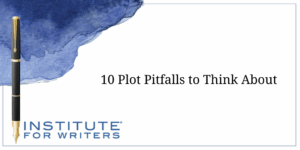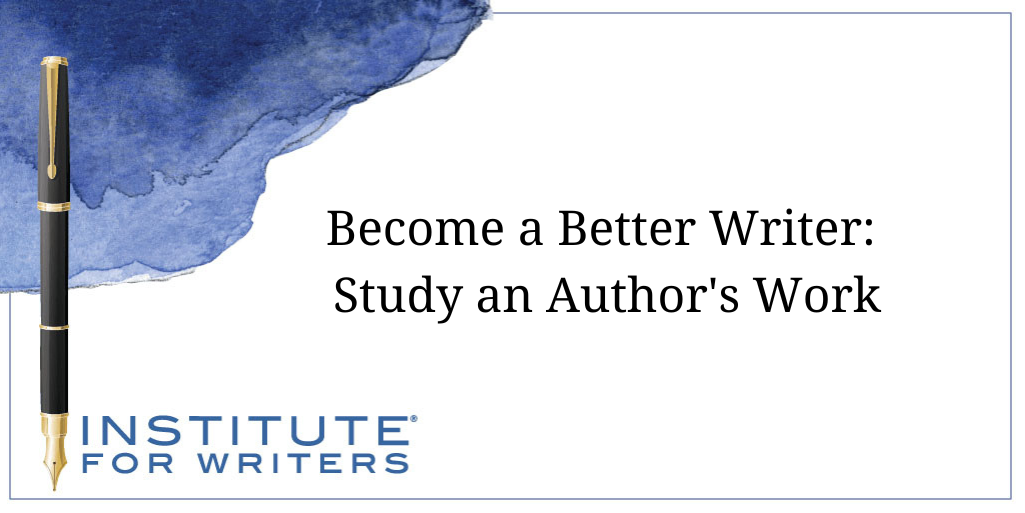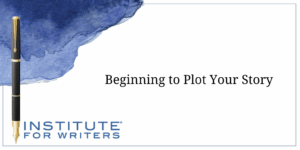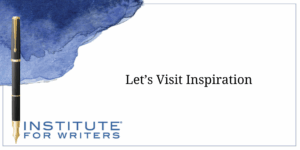
10 Plot Pitfalls to Think About
Plot can be tricky, and, as a writer, you need to be aware of what makes or breaks plot. Take a look at 10 different things to avoid in your own writing.

We teach our students how to write and get published!
View our Course Catalog >
Even those who work through the season will probably agree that somehow the long weeks of summer seem a bit loose in structure and can provide many of us with opportunities to write and read more. Summer can be an excellent time to concentrate our reading on just one author, or a series of authors, and become a better writer for it.
I began to learn the value of studying successful writers’ works one summer many years ago when I lived in New York City. A colleague and I were finishing up at a restaurant during our lunch hour. I stood to walk back to work but froze in place when I heard a high-pitched, familiar-sounding voice. Two tables away sat author Truman Capote with another man, quite possibly his editor. I was captivated.
“We must say hi to him,” I whispered to my lunchmate and then found myself standing at the author’s table. “Mr. Capote,” I said. “I am one of your biggest fans.” I smiled and he looked up and thanked me, then signed a cocktail napkin I placed in front of him. I am pretty sure I floated out of the restaurant after just locking eyes with a writing icon.
Within a week I had reread his classic In Cold Blood, then took Breakfast at Tiffany’s out of the library. I followed that with the short stories in Music for Chameleons, and when Answered Prayers came out a couple of years after his 1984 death, I bought it rather than waiting for the library copy.
Paying close attention to the way Truman Capote wrote was important to me as a writer. He was a master of his craft and had successfully merged journalism with fiction in In Cold Blood, the book that christened him as the creator of what is sometimes called the nonfiction novel. There were critics against his invented dialogue (many writers and editors still frown on that) and who questioned Capote’s creation of events that may not have happened the way he wrote, but his writing is immensely readable and interesting, and his success is undisputed.
Truman Capote’s books expertly merge details and dialogue to create images that help the reader envision what is happening and feel as though they are there in the story. As I read his books, I sometimes copied entire passages into my notebook just to analyze his words and how he put them together. My intent was to figure out how the writer was able to bring out his story so well.
In the years since my “obsession” with Capote’s writing, I have done what I loosely call an Author Study with dozens of writers. Although James Patterson is not one of my favorite authors, his work seemed to be worth studying because of his gigantic publishing success and the sheer volume of his work. Patterson has written over 200 books, of which I have read about ten. I was intrigued by his short, sometimes one- or two-page chapters, and studied their structure.
When I saw him at a book reading, an audience member asked him about that aspect of his style. Patterson said that readers liked the short chapters because they felt as though they were making fast progress as they read. Creating such short chapters is not a structure other writers would necessarily want to emulate but was certainly interesting to study and think about.
Authors I have most recently studied include Reynolds Price, Amor Towles, Stephen King, and Maggie O’Farrell. I was brought to Reynolds Price after coming across and loving his book, Kate Vaiden. I sought out more of the Southern writer’s novels with a goal to analyze how he so strongly connects his readers with his characters. Stephen King’s books don’t appeal to everyone, but his success at putting his readers right in a scene, frightened along with his characters, is sometimes astounding. Amor Towles’ unique and clever story ideas are worthwhile to pay close attention to, and Irish novelist Maggie O’Farrell’s novels are a good study of how to keep a reader intrigued until the last page of a story. My time spent studying each of these writing professionals was worthwhile and interesting.
As you think about authors whose work you enjoy and may want to study, it doesn’t matter whether the writer has written three books or a dozen. The goal is to find someone whose work you like and read as many of his or her books as you can. As you read, think about why you may like one of the author’s books but were maybe disappointed in another. Read dialogue aloud to yourself and pay attention to why it works and how it may differ in style across chapters and across books. Study the way the writer describes certain parts of a scene and how he or she may discretely foreshadow an event to come. Look at how the writer begins and ends chapters and think about why you may be hooked from the start of a book or why you believe the text drags and the story does not take you along. Decide why you may have liked a character in one of the writer’s books so much but did not care about the protagonist in another.
Other novelists’ work is not just interesting to read, but invaluable to us as writers. Since the authors you are studying are successfully published, they are writing in a way that appeals to an agent and an editor – and their target reading audience. For that reason, their books can almost be thought of as textbooks for our craft as we seek to engage agents and publishers for our own work. Take notes as you read and think about how you present your own written text. Remember that our goal is not to copy how other writers do it but to learn from their words. Paying close attention to how other successful writers put together their words, sentences, paragraphs, and chapters can help you become a better writer.
Susan Ludwig, MA has been an instructor with the Institute of Children’s Literature for over 17 years. Susan’s writing credits include teacher resource guides, English language learner books, and classroom curriculum for elementary through high school students. A former magazine editor, she assesses students’ written essays as a scoring director for the SAT exam. When she is not writing or working, she is usually found cooking or curled up with a good book.

Plot can be tricky, and, as a writer, you need to be aware of what makes or breaks plot. Take a look at 10 different things to avoid in your own writing.

Plot is more than just the chain of events within a story. There are so many elements to plot to consider when writing. Let’s dive into those elements.

Visiting new places is key to exploring new ideas and finding inspiration. Let’s see the places you can go this summer to spark your next story.
1000 N. West Street #1200, Wilmington, DE 19801
© 2024 Direct Learning Systems, Inc. All rights reserved.

1000 N. West Street #1200, Wilmington, DE 19801
© 2025 Direct Learning Systems, Inc. All rights reserved.

1000 N. West Street #1200, Wilmington, DE 19801
©2025 Direct Learning Systems, Inc. All rights reserved. Privacy Policy.
3 Comments